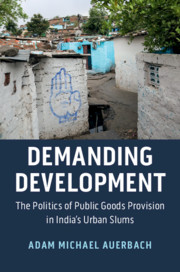Book contents
- Demanding Development
- Cambridge Studies in Comparative Politics
- Demanding Development
- Copyright page
- Dedication
- Contents
- Figures
- Tables
- Acknowledgments
- 1 Puzzling Disparities at the Margins of the City
- 2 Setting the Stage
- 3 How Party Worker Networks Impact Local Development
- 4 India’s Slum Leaders
- 5 Views from the Ground
- 6 Party Workers and Public Goods Provision
- 7 Why Party Worker Networks Spread Unevenly Across Settlements
- 8 Conclusion
- Book part
- Bibliography
- Index
- Other Books in the Series (continued from page iii)
3 - How Party Worker Networks Impact Local Development
Published online by Cambridge University Press: 15 October 2019
- Demanding Development
- Cambridge Studies in Comparative Politics
- Demanding Development
- Copyright page
- Dedication
- Contents
- Figures
- Tables
- Acknowledgments
- 1 Puzzling Disparities at the Margins of the City
- 2 Setting the Stage
- 3 How Party Worker Networks Impact Local Development
- 4 India’s Slum Leaders
- 5 Views from the Ground
- 6 Party Workers and Public Goods Provision
- 7 Why Party Worker Networks Spread Unevenly Across Settlements
- 8 Conclusion
- Book part
- Bibliography
- Index
- Other Books in the Series (continued from page iii)
Summary
Chapter 3 presents the book’s theoretical framework. It explains why settlements with dense concentrations of party workers are better positioned to demand public services than those with thin or absent networks. The discussion is set around three mechanisms undergirding this relationship: political connectivity, mobilization capacity, and the informal accountability generated by competition among party workers for a following. The chapter further considers the implications of having party workers affiliated to competing parties, which I argue has several countervailing influences on public service delivery. Next, the chapter takes a step backward in the sequencing of events and asks why settlements vary in the density and partisan balance of their party workers. I argue that two variables – settlement population and ethnic diversity – shape bottom-up incentives for residents to engage in party work and top-down incentives for parties to extend their organizational networks.
Keywords
- Type
- Chapter
- Information
- Demanding DevelopmentThe Politics of Public Goods Provision in India's Urban Slums, pp. 65 - 91Publisher: Cambridge University PressPrint publication year: 2019

